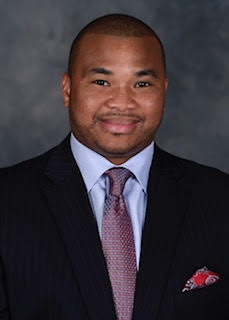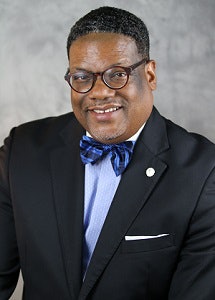“The only constant in the technology industry is change.” –Marc Benioff
It’s never too early to start making plans to acquire a job after graduation. For college grads to have success in today’s job market, they must do more than just earn a degree; they must prepare —over their entire college years.
Of course, getting a good education and graduating are a student’s top priority in terms of preparation. However, in an ever-changing, highly competitive, technology-savvy work environment out there, a little work above and beyond one’s studies could give any college grad a competitive edge.
That said, it is highly recommended that all graduates have a firm grasp on popular technology tools, social media platforms and prominent computer software and systems — no matter their chosen career path.
 Dr. Adriel A. Hilton
Dr. Adriel A. HiltonSo, let’s get serious and talk social media. Today’s professional is typically hired via a three-step process:
1) an online application
2) then a phone interview, after being vetted, and
3) a one-on-one interview and/or a group interview.
First important piece of advice: Before even going online to apply for a job, make sure your social media platforms — Facebook, Instagram, Twitter, etc. — are purged of all questionable photos and posts. You can count on any hiring company to have thoroughly scoured all of your social media accounts before even considering you for the phone interview.
For current students, once you decide on a degree and ultimate career path, it’s crucial to keep up with what’s happening in that business. Why? Within those four or five years a person is attending college, numerous changes could have occurred within that industry, possibly revolutionizing the knowledge base with which a student started his or her undergrad.
Second bit of advice: Stay in sync with that industry by combing the web for current news and events. Take every opportunity to secure an internship, apprenticeship, co-op and/or work study program to establish a mastery within that discipline. Also, seize any professional development opportunities offered as this could be a key component to even further success in a chosen career.
Third essential slice of advice: LinkedIn. If you do not have an account, get one — and keep it updated throughout your college years. LinkedIn is a running account of one’s accomplishments, work experience and/or personal website. For example, if you’ve taken internships, apprenticeships, professional development, work study, freelancing, or even outside jobs, update your profile.
 Dr. Marcus A. Chanay
Dr. Marcus A. ChanayLinkedIn is not “social” media but rather about business networking and connections. Unlike Facebook, LinkedIn is about the quality of your connections, not quantity. Any experience that showcases your talent or enhances your resume should be on this site, such as volunteering, mentoring, teaching assistant or other career-builders. Invite key contacts from internships, employers, work study, etc. to connect with you on LinkedIn. If it was a good experience, ask for a written recommendation on your page.
Fourth piece of advice: Get involved and network. Current students, there is no easier way to get to know people at your school than to get involved in student-oriented activities, clubs and organizations. Being actively involved on campus can open doors to so much more. For example, experiences like work study, volunteering, mentoring, community projects, and invitations to events could possibly improve one’s self-confidence, as well as oral and written communication skills in some way.
Inclusion is a major buzzword in today’s professional climate and diversity has been proven to play a significant role in social development. Having attended several historically Black colleges and universities (HBCUs), a huge benefit is having a great deal of exposure to diversity.
HBCUs are also known to operate like extended families, where students are well positioned to leverage HBCU alumni programs, past professors, and fellow alumni to establish a priceless network full of rich connections and unlimited opportunities. However, networking is not exclusive of HBCUs. It’s about recognizing opportunity and making the effort.
Bottom line: a successful preparation strategy for the college end-game — finding a job — entails so much more than academics alone. True preparation for the future includes how students function outside of the classroom, on their own, and in a professional setting, including how they interact with others, mixed with a good use of today’s technology.
“There is no greater education than one that is self-driven.” –Neil deGrasse Tyson
Dr. Marcus A. Chanay is vice president for student affairs at Lincoln University of Missouri. Dr. Adriel A. Hilton is dean of students and diversity officer at Seton Hill University.


















